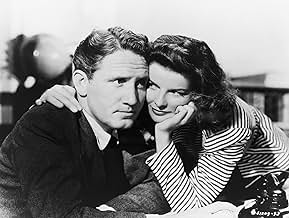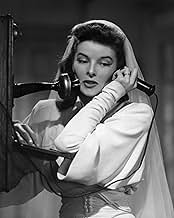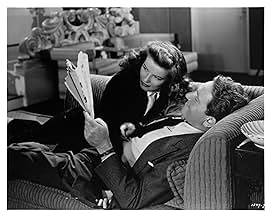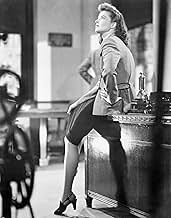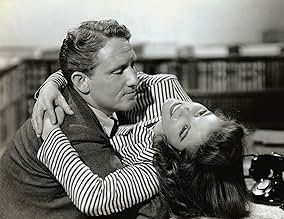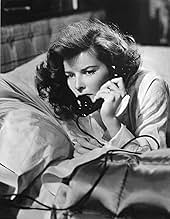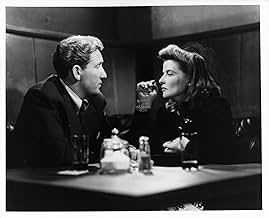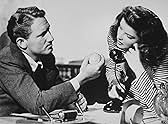Sportswriter Sam Craig and columnist Tess Harding, with the same New York newspaper, overcome their initial antagonism, fall in love and get married, only to find their relationship strained... Read allSportswriter Sam Craig and columnist Tess Harding, with the same New York newspaper, overcome their initial antagonism, fall in love and get married, only to find their relationship strained when he comes to resent her hectic lifestyle.Sportswriter Sam Craig and columnist Tess Harding, with the same New York newspaper, overcome their initial antagonism, fall in love and get married, only to find their relationship strained when he comes to resent her hectic lifestyle.
- Director
- Writers
- Stars
- Won 1 Oscar
- 5 wins & 2 nominations total
- Dr. Lubbeck
- (as Ludwig Stossel)
- Cab Driver
- (uncredited)
- Stage Doorman
- (uncredited)
- Phone Girl
- (uncredited)
- Baseball Fan
- (uncredited)
- Director
- Writers
- All cast & crew
- Production, box office & more at IMDbPro
Featured reviews
I think that's what the authors of the screenplay Michael Kanin and Ring Lardner, Jr., had in mind in the script as well. As mismatched a pair if there ever were, he a down to earth sports columnist and she a world famous news reporter and commentator, fall in love.
As her celebrity is much wider known than his, Hepburn expects to have it all her own way. The rest of the film is concerned with their efforts to adjust to each other.
Katharine Hepburn's character is based on liberal radio commentator and reporter Dorothy Thompson. Not surprising that no one has mentioned that yet in all the reviews so far. The giveaway is Tracy first hearing her voice on the radio while in his favorite sports bar on Information Please where Thompson was a guest. Her career petered out after World War II, so she's not known to today's audience.
Writers Kanin and Lardner had as a model for the Tracy character Lardner's own father. Ring Lardner was one the celebrated sports writers of the first half of the 20th century, a great reporter and humorist. While Tracy is not as witty as Ring Lardner, he is definitely as down to earth.
My favorite scene is Spencer Tracy trying to feel comfortable at an international gathering at her place, looking even for people who speak English. Of course she's equally as uncomfortable at William Bendix's bar where Tracy likes to hang out.
Hepburn, comfortable in her celebrity, just sails through life, getting awards here and there. When she thinks of a Greek orphan kid she gets pressured into taking in as another award, that's when Tracy puts his foot down.
Based on some real celebrities, Tracy and Hepburn become those celebrities in the flesh. It's an awesome debut for what turned out to be a great screen team.
Look for fine performances by William Bendix, Fay Bainter, Minor Watson and Dan Tobin. Kanin and Lardner copped the film's only Oscar for an original screenplay. Hepburn was nominated for Best Actress, but lost to Greer Garson in Mrs. Miniver.
If Woman of the Year were remade today, the producers might consider making the woman the sports reporter. Seeing Jeannie Zelasko covering the World Series this year, I'm sure it would work very well.
Hebpurn: Well, we're alone. Talk. You do have something to talk about? Tracy: Yeah, yeah. You. You. I'd like to know what you like and don't like, and how you feel about being you. Hepburn: I feel very good about it. Always have. I like knowing more about what goes on than most people. Tracy: And telling them. Hepburn: Yeah, and telling them.
Last 45 minutes: 5 stars. The film starts unraveling with Hepburn's rash decision to adopt a refugee, not because that's a bad thing (it's a great thing), but because she does so without telling her husband, or without the slightest thought to actually caring for the child. It spirals from there until that horrific prolonged ending scene, where this intelligent, brilliant woman fumbles around in the kitchen, apparently not knowing how to use a toaster. It's, quite frankly, god-awful on every possible level.
The message is loud and clear: if a woman chooses to focus on a career, she will neglect her husband, not have a clue about raising kids, and be incompetent at performing wifely tasks like making breakfast. It's terribly insulting, and undoes a lot of the great things it did in the first 70 minutes. Hepburn's character wins the "Woman of the Year" award, but it's ironically Tracy who is showcased as award-worthy, for having put up with the "difficult case" of his wife, remained level-headed, and taught her a good lesson in what it takes to have a good marriage.
The only small saving grace is that his character suggests she can have both, a career and a family, as long as she doesn't go to extremes in either. It's only too bad the film didn't simply show us how women can do this balancing just as well as men, but it was 1942, and a lot of people - including those in powerful positions - were simply not ready for this message.
Tess and Sam meet when they have a war of words in their articles over baseball, and when the editor tells them to make up, that is when they begin seeing each other. Now Tess doesn't hide how busy she is, or how full her apartment often is of people from all over the world that she knows, yet Sam marries her and I get the feeling that he is disappointed that nothing changes. Their wedding being practically a drive through affair should have given him a hint.
So naturally the marriage eventually fails when Sam walks out. That is Tess' first surprise. Her second surprise is when the woman she has patterned herself after for years and years, Ellen Whitcomb (Fay Bainter), makes a totally unexpected, but not unwelcome, move. How does this all work out? Watch and find out.
I'm not sure this film is ultimately sexist or feminist. It does look like the script was trying to paint Hepburn's character as an ice queen, and she just acted her way out of being portrayed in that fashion. She ultimately plays it as a person who, if she takes up a task, goes all the way with it, right down to the humorous scene where she tries to make breakfast and acts like every utensil in the kitchen is from another planet, yet she persists in the face of hilarious adversity and inexperience. However, if you turn the roles of Sam and Tess around, you could say this was a feminist film, maybe giving men a dose of their own 1942 medicine when they expected women to just live with whatever work schedule the man had, even if they sat home alone at nights.
I'd highly recommend this as one of the great romantic films, and they didn't make many of those during WWII outside of Casablanca.
Did you know
- TriviaKatharine Hepburn refused to reveal who wrote the screen play to Louis B. Mayer until after he bought the project from Hepburn. Hepburn was afraid that Mayer would low-ball the two authors (Michael Kanin and Ring Lardner Jr.) because, at the time, they were both relatively unknown.
- GoofsIn the kitchen, Tess uses a vacuum coffee maker (Cona). However, if she had put the coffee in the bottom of the coffee maker and the water in the top, as shown, it wouldn't have made coffee at all.
- Quotes
Tess Harding: [In the stands at the ballpark, observing the large crowd in attendance] Are all these people unemployed?
Sam Craig: No, they're all attending their grandmother's funeral.
- Alternate versionsThere is an Italian edition of this film on DVD, distributed by DNA Srl: "LA DONNA DEL GIORNO (1942) + INCANTESIMO (1938)" (2 Films on a single DVD, with "Woman of the Year" in double version 1.33:1 and 1.78:1), re-edited with the contribution of film historian Riccardo Cusin. This version is also available for streaming on some platforms.
- ConnectionsFeatured in George Stevens: A Filmmaker's Journey (1984)
- SoundtracksBridal Chorus (Here Comes the Bride)
(1850) (uncredited)
from "Lohengrin"
Written by Richard Wagner
Played on an organ at the wedding
- How long is Woman of the Year?Powered by Alexa
Details
- Release date
- Country of origin
- Languages
- Also known as
- La mujer del año
- Filming locations
- Production company
- See more company credits at IMDbPro
- Runtime
- 1h 54m(114 min)
- Color
- Aspect ratio
- 1.37 : 1



